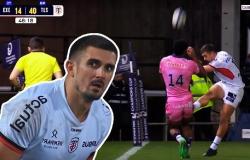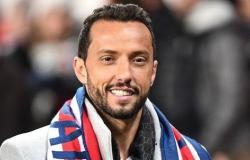The truth has just come out: Matvei Michkov and Martin St-Louis would never have worked together.
The “soft” management of St-Louis and its inability to impose clear standards would have been a real obstacle to Michkov’s development.
Kent Hughes and Jeff Gorton, already aware of this problem, preferred to avoid a predicted catastrophe.
Let’s look at what’s happening in Philadelphia. John Tortorella, a trainer known for his strict discipline and uncompromising approach, supervises Michkov with an iron fist…but with incredible results.
Since being left out for two games in early November, Michkov has responded brilliantly: 17 points in 16 games, a +11 record, and above all, a defensive responsibility that has surprised even his biggest detractors.
Tortorella imposed a clear message:
“If a player doesn’t react in the right way, he’s going to continue to sit. I’m not in the business of playing daycare. I’m in the business of teaching. »
These scathing remarks demonstrate the difference with Martin St-Louis, who would have done everything to spare Michkov, in the name of a more “benevolent” approach.
The problem? Michkov did not need a pastoral leader, he needed an authoritarian leader, capable of educating him without giving him a free pass.
Martin St-Louis, often praised for his pro-player approach, has shown his limits. In Montreal, errors are not punished.
Kirby Dach can take stupid punishments without being put in his place. Juraj Slafkovsky can roam the ice or attack journalists, without ever fearing punishment.
Imagine Michkov in such an environment: his attempts at fanciful play, like the famous “Michigan”, would be applauded by St. Louis without any correction.
Tortorella spoke about it frankly:
“I don’t like this game. I think it has no place in our sport. But I’m not going to punish him for that. I just want him to understand when and how to use his skills. »
That’s the difference between teaching and flattering. Tortorella channels Michkov’s raw talent while setting clear standards.
In Montreal, St-Louis would have been incapable of transmitting this message. The results? An immature version of Michkov, wasted in a permissive environment.
These are the real consequences of a “soft” environment
We understand better why Kent Hughes and Jeff Gorton preferred to avoid Michkov during the draft.
The management duo knew full well that St-Louis was not the right man to manage such explosive talent.
With Tortorella, Michkov learns to balance his creativity with uncompromising authority. He was scratched from the lineup, he was criticized for costly penalties, but he learned.
His +11 record proves that he is no longer just an offensive-minded striker; he becomes a complete player.
In Montreal, under the governance of St-Louis, this process would never have taken place. The country club mentality is said to have stifled Michkov and stunted his development.
If some supporters still criticize the decision to have preferred David Reinbacher to Matvei Michkov, it is time to see things from another angle.
Hughes and Gorton knew that with St. Louis, Michkov would have been poorly supervised. The young Russian, often described as “intense and demanding”, would have needed a firm grip, a model capable of pushing him to his limits.
Martin St-Louis has never been that kind of coach. His philosophy, based on trust and patience, may have its merits with some players, but it does not suit explosive talents like Michkov.
Clearly, Montreal was spared a potential monumental clash between a player in search of excellence and a coach who was too “gentle”.
Philadelphia’s choice with Michkov demonstrates what a strict and disciplined environment can accomplish. John Tortorella, with his authoritative character, is exactly what Michkov needed to reach his full potential.
In Montreal, the reality is quite different. Martin St-Louis, despite his good will, is prisoner of an overly permissive approach which produces neither results nor discipline.
The fans see it: the team lacks rigor, mistakes are repeated, and the players get bogged down in mediocrity.
If Kent Hughes and Jeff Gorton had selected Michkov, they would have sacrificed a diamond in the rough in an environment incapable of polishing it.
The decision to pass their turn is logical… but revealing. The problem is not Mishkov. The problem is Martin St-Louis.
An authoritative leader is essential to building winners. Montreal, with its country club and overly lenient coach, simply doesn’t have what it takes to develop a player like Michkov.
The lesson is painful, but clear: as long as the country club persists, exceptional talents will have no place in Montreal.
The million dollar question: would CH need a coach like John Tortorella?
John Tortorella is often described as a dinosaur in the modern hockey world, but his method is anything but outdated.
With Matvei Michkov, he managed to find a fine balance between discipline and development, without ever compromising structure or expectations of his player.
When Michkov was scratched from the lineup for two games in early November, Tortorella didn’t make that decision to punish him for free.
He had a clear message to convey: defensive errors and laziness without the puck would not be tolerated. Michkov’s response was immediate and exemplary:
“I knew he was going to react correctly. Otherwise he would have continued to sit. I’m not here to mother, I’m here to teach. »
It’s not cruelty, it’s transparency. Tortorella gave Michkov the chance to correct his shortcomings and prove his worth.
The result? Since his return, the young prodigy has amassed 17 points in 16 games while posting an impressive +11 differential.
But the most striking thing remains his defensive play: he is no longer a defensive danger, he has become a complete player.
Tortorella’s method does not rely solely on individual confrontations. He also ensures that the environment around Michkov supports his learning.
The team’s veterans, like Sean Couturier, play a key role in this process:
“He’s learning to be responsible without the puck. He earns our trust, and that’s huge. »
On the ice, Michkov’s teammates, like Owen Tippett, transmit the coach’s messages in real time. Tortorella does not hesitate to entrust them with part of the responsibility:
“There’s a lot of communication. We want Matvei to know exactly what to do. When I can’t talk to him, his teammates relay the message. »
This approach creates a unique synergy. Michkov does not feel isolated; on the contrary, he sees that his team believes in him, while maintaining high standards.
This structural support, combined with Tortorella’s authority, forms a player who understands that no mistake is excused, but every lesson is an opportunity to improve.
Imagine for a moment Michkov under the direction of Martin St-Louis. Would he have been left out for two games? Probably not.
Instead, St-Louis allegedly attempted to “feed” Michkov with vague encouragement and misplaced indulgence.
The result would have been predictable: Mishkov would have continued to play irresponsibly, without ever correcting his shortcomings.
The fundamental difference between Tortorella and St-Louis is there. Tortorella is not afraid to shake things up to make a player understand what is expected of him. St-Louis, for his part, prefers to play the card of benevolence, an approach that can work with certain players, but which would have failed miserably with an explosive and intense talent like Michkov.
“He has a competitiveness and a fire in him that I love”a dit Tortorella en parlant de Michkov.
This is precisely the fire that could have been snuffed out in Montreal, where country club culture allows players like Slafkovsky or Kirby Dach to get through disgraceful games without consequences.
Matvei Michkov is becoming an elite player thanks to a tough and transparent method. John Tortorella has proven that, even in an era where hockey is moving towards more “softness”, a demanding coach can get the best out of his players.
In Montreal, this requirement is non-existent. Man-to-man coverage is a disaster, mistakes are rampant, and no player seems to fear the repercussions.
In such an environment, Michkov would have stagnated, becoming another frustrated player, lost in a culture of child kings.
The truth, as harsh as it is, is that Martin St-Louis was not ready for Michkov. Kent Hughes and Jeff Gorton realized this too late, but they at least avoided a resounding failure by not selecting the young Russian.
The problem, however, remains: as long as the Montreal Canadiens refuse to impose high standards on their players, this team will continue to vegetate in mediocrity.
The contrast between Philadelphia and Montreal is striking. On the one hand, an uncompromising coach who pushes exceptional talent towards excellence; on the other, a coach who manages his team like a social club where mistakes go unnoticed.
If the Canadian really wants to rebuild, he must ask himself a crucial question: Is Martin St-Louis the man for the job?
Because if a player like Michkov needs a Tortorella, what message are we sending to Montreal by accepting softness and excuses?
Kent Hughes and Jeff Gorton can count themselves lucky to have avoided a marriage doomed to failure.
But the most worrying thing remains: the cultural problem persists in Montreal. As long as rigor does not replace complacency, the Montreal Canadiens will continue to dream of the champions they will never train.





